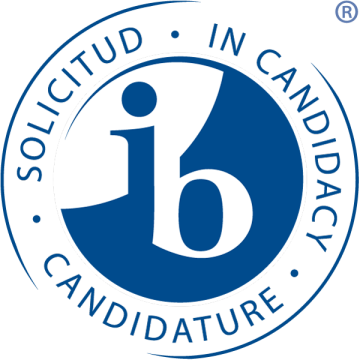International Baccalaureate (IB)
Do you aspire to obtain an international diploma? Enroll or transfer to our school and join the IB program. We have become a candidate school for the prestigious International Baccalaureate (IB) Diploma Program!

What is an IB Diploma Programme?
The International Baccalaureate Diploma Programme (IB DP) is a two-year international educational programme for students aged 16–19. It is recognised by universities around the world and is valued for its academic rigour, development of critical thinking, research skills and global perspective. The programme culminates in an internationally recognised final examination.

Fostra's mission is to cultivate students' personal growth, equip them with 21st-century competencies, and instill a sense of social responsibility, thereby preparing them for a fulfilling and successful future.
Why choose IB Diploma?
International recognition of the school leaving examination by universities in the Czech Republic and abroad
Emphasis on independence, analytical thinking, and cooperation
Study in English
Development of students as active, inquisitive, and ethically minded individuals
Opportunity for in-depth study of selected subjects
Tuition for IB program
year - 149 000 Kč
year - 149 000 Kč
year - 229 000 Kč
year - 229 000 Kč
IB final exam: 25 000 Kč
Textbook prices (3. and 4. grade): 5 000 Kč/year
Gymnázium Fostra International is a candidate school* for the International Baccalaureate (IB) Diploma Programme and pursuing authorization as an IB World School.
IB World Schools share a common philosophy—a commitment to improve the teaching and learning of a diverse and inclusive community of students by delivering challenging, high quality programmes of international education that share a powerful vision.**
*Only schools authorized by the International Baccalaureate can offer any of its four academic programmes: the Primary YearsProgramme (PYP), the Middle Years Programme (MYP), the Diploma Programme or the Career-related Programme (CP). Candidate status gives no guarantee that authorization will be granted.
For further information about the IB and its programmes, visit www.ibo.org
**Mission Statement from the IB
The International Baccalaureate aims to develop inquiring, knowledgeable and caring young people who help to create a better and more peaceful world through intercultural understanding and respect. To this end the organization works with schools, governments and international organizations to develop challenging programmes of international education and rigorous assessment. These programmes encourage students across the world to become active, compassionate and lifelong learners who understand that other people, with their differences, can also be right.

When and who is it for?
The IB Diploma Programme is designed for students in their final two years of secondary school. The programme is suitable for students who are motivated, independent and want to prepare for study at high-quality universities at home and abroad.
What stage are we at?
Fostra International High School is currently a candidate school in the process of authorisation for the IB Diploma Programme (IB DP). This means that we have officially begun preparations for the introduction of this internationally recognised programme and are working to meet all the requirements of the International Baccalaureate Organization. Candidate status does not yet guarantee final approval, but it represents an important step towards full accreditation.
Program Structure
Students choose six subjects from different areas, three at higher level (HL), which cover the material in greater depth, and three at standard level (SL). The program also includes three subjects that all students must take:
Theory of Knowledge (TOK) – a philosophical subject that develops critical thinking
Extended Essay (EE) – independent research project
Creativity, Activity, Service (CAS) – extracurricular involvement and personal growth
IB program FAQ
Becoming an IB World School means adopting international standards of educational quality, emphasizing holistic student development, and committing to continuous improvement. For students, this means access to education that is academically challenging, develops independence, critical thinking, and global awareness, and prepares them for study anywhere in the world.
The IB summarizes the IB Learner Profile—ten characteristics of an ideal graduate: Inquirer, Knowledgeable, Thinker, Communicator, Principled, Open-minded, Caring, Risk-taker, Balanced, Reflective.
Holistic development is at the core of the IB philosophy – the goal is not just to “produce a successful student,” but to “raise a well-rounded and value-based young person who thinks about the world and wants to improve it.”
The IB DP is a two-year program for students aged 16–19 (i.e., 3rd and 4th year of high school). Compared to the Czech maturita, it offers:
a choice of 6 subjects from different areas (languages, mathematics, natural sciences, humanities),
a compulsory core (CORE): Theory of Knowledge, Extended Essay, CAS,
instruction in English,
a strong emphasis on skills, not just knowledge,
formative assessment, and international exams.
The IB Diploma is recognized by hundreds of universities around the world. Most of them offer IB students specific admission conditions. In the Czech Republic, the IB Diploma is recognized as equivalent to the maturita (often with nostrification). Here you will find a list of universities from around the world that are registered with the IBO and recognize the IB DP:
You can also filter by specific countries. If you cannot find a university that interests you here, it does not mean that it does not accept IB DP education, only that it is not registered with the IBO. It is best to contact the university directly to find out the details; it is possible that it still recognizes the IB DP as proof of completed secondary education.
The IB DP emphasizes:
analytical and critical thinking (Theory of Knowledge and other subjects),
research skills (Extended Essay),
personal development and social responsibility (CAS),
communication, collaboration, digital literacy, and global citizenship.
Students choose their subjects and essay topics.
They are responsible for planning their projects and managing their time.
They keep reflective journals, participate in debates, and argue their points.
They learn self-motivation and perseverance.
6–7 teaching hours per day,
most lessons in English,
independent work on essays, CAS activities,
individual consultations with teachers,
blocks for TOK or mentoring.
Combination of formative (ongoing) assessment and final IB exams,
emphasis on feedback and self-assessment,
final assessment (0–7 points for each subject, max. 45 points in total).
Students appreciate the international environment, project work, and independence.
They often mention the difficulty, but also the meaningfulness and practical application of what they have learned.
For them, the IB diploma is a “passport to the world.”
International student conferences (e.g., IB World Student Conferences),
collaboration on online projects between schools,
the possibility of individual exchange stays as agreed between schools.
The MyIB online platform for students and teachers,
international projects within CAS,
meetings with experts from around the world,
a strong alumni network of IB graduates.
IB is a mark of quality and innovation,
helps attract ambitious students and teachers,
increases the school's credibility in the eyes of parents and partners,
international recognition = better cooperation with universities and companies.

Read more about the IB programme
Are you interested in more details about the program? You can write to Mgr. Lenka Vopařilová – she will be happy to answer your questions.

Mgr. Lenka Vopařilová
School Curriculum & IB Coordinator



